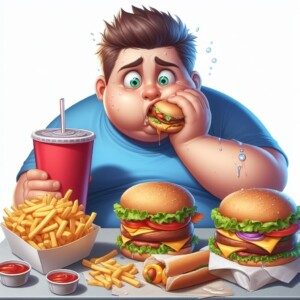
Wow, could it be true, that something called “pleasure receptors” could be a leading cause of eating too much, of downing a whole box of donuts or quart of ice cream in one sitting?
So what’s causing you to overeat besides boredom, stress and delicious food?
The cause of overeating may be fewer pleasure receptors in your brain … according to Eric Stice, a senior scientist at the Oregon Research Institute, and a senior research fellow at the University of Texas. The study report is in the Journal of Neuroscience (2010).
Here’s what happens when you eat: More dopamine is released. Dopamine is a neurotransmitter in the brain.
The pleasure you get from eating your favorite foods is directly proportional to the quantity of dopamine that’s released.
Obese individuals, when compared to lighter-weight people, have a smaller number of dopamine receptors.
This suggests that the obese person will overeat to compensate for this smaller number of dopamine receptors.
The obese person will need to eat more, to get the same pleasure or satisfaction from eating, while slimmer individuals will need to eat less food to get the same rewarding response of satiation.
But the problem doesn’t stop there. In the obese person, the overeating to reap that satisfaction gets amplified by the overeating!
Says Stice in the report: “The weakened responsivity of the reward circuitry increases the risk for future weight gain in a feed-forward manner. This may explain why obesity typically shows a chronic course and is resistant to treatment.”
Now, before you blow this off as a bunch of baloney, images of the brain seem to support this finding.
Solutions to the Brain Receptor Issue
“There are receptors in the brain that target eating behaviors such as the ‘hunger’ hormone (ghrelin, among others),” says Susan L. Besser, MD, with Mercy Medical Center, Baltimore; Diplomate, American Board of Obesity Medicine and board certified by the American Board of Family Medicine.
“These hormones help to regulate eating behaviors. There are pleasure receptors too, similar to receptors that contribute to cravings of other substances.
“So yes, these hormones and receptors do affect one’s eating behavior.
“By the way, there is research and now some medications that are used to block these receptors to reduce one’s cravings (an example of this would be Buproprion).
“Just like some people don’t have cravings for other substances — such as alcohol, drugs or tobacco — the same could be said about food cravings.
“Some people are just less susceptible to cravings. Does this mean they actually have more brain pleasure receptors? Possibly, but the research is very limited here (but ongoing).”
Other Causes of Overeating must Be Addressed
They are: stress, anxiety, boredom, social cues (being around other people who are eating; coworkers bringing in baked goods; spouse offering food), miscellaneous cues (TV, chatting on phone, smelling fresh baked goods at grocery store), upbringing (e.g., being rewarded or calmed with food) and poor health habits that trigger hunger, such as eating too much refined food, and inactivity.
Nevertheless, the functional magnetic resonance imaging that was used to measure brain responses in study subjects, can’t be ignored, either.
The participants were tracked for six months, and the imaging on their brains measured responses to a chocolate milkshake.
Those who gained weight showed much less activation in a key area of the brain (dorsal striatum) in response to the milkshake at the six-month follow-up, compared to their original brain scan, and relative to subjects who did not gain weight.
So if you think fewer dopamine receptors are causing you to overeat … re-examine your cues and triggers for overeating, and you’ll surely discover causes that are not related to hunger, though excess intake of refined foods can cause overeating by triggering hunger (white rice, anyone?).
A good trick to practice, if you find it difficult to control the urge to overeat, is to tell yourself ahead of time that you will absolutely stop eating when you realize you’re approaching satiation.
Satiation is when you still have room for more food, but your stomach no longer feels like it’s empty, and you no longer feel it’s time to eat.
Do not eat past the point of satiation, no matter how delicious the food is.
Remind yourself that you can store the food for later eating, when you’re hungry again.
Another trick is to remind yourself that the pleasure of eating is greatest when you’re hungry, not when you’re satiated, let alone full or stuffed.


























